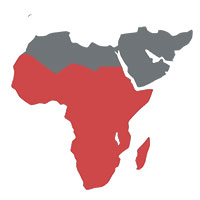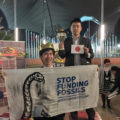Don’t Be such a Colossal… Fossil
Su-Kim M | November 18, 2016.
COP22 was meant to be the meeting of action, but it has been a relatively quiet conference with a total of 12 Fossil of the Day awards handed out. The absence of contentious content shows that while countries may show up to their negotiations, they are still failing to step up with commitments that match the responsibilities required by their level of emissions.
In this vein, the COP22’s Colossal Fossil award was handed to Russia. As the highest emitting country that has signed but not yet ratified the Paris Agreement, Russia has continued public support for fossil fuels throughout the conference and championed nuclear power over renewable technology as part of their climate change strategy.
Russia was one of the first place recipients for the Fossil of the Day award yesterday thanks to their continued use of fossil fuels. Russian presidential adviser Alexander Bedritsky declared this week that Russia does not intend to phase out fossil fuels, but instead plans to explore and develop clean technologies for coal, oil and gas. Russia also received Fossil recognition this week for their insistence on pushing nuclear power, diverting funding away from clean renewable energy sources that do not have the emissions and safety concerns of nuclear options.
This Colossal Fossil demonstrates that civil society has taken notice that Russia is not dedicated enough to their responsibilities as a high emitting country (the fourth highest emitter in the world with 5% of global emissions) and will continue to lobby them to take stronger climate action.
Those countries awarded the remaining Fossils throughout the COP22 had similarly failed to step up to their emission reduction potential, showing a clear disconnect between the rhetoric they are spouting at the conference and their own domestic activities which are still using or developing fossil fuels.
On a positive note, The Climate Vulnerable Forum (CVF) brought a renewable-energy powered ray of hope to the last day of the conference. The ‘Ray of the COP’ award went to the CVF as they launched the Marrakech Vision today, which lays out a path for the 43 countries in the CVF plus Gambia, Lebanon, Palestine, Samoa and Colombia to develop sustainably and reach 100% renewable energy between 2030 and 2050. The leadership demonstrated by the world’s most vulnerable countries to climate change, despite their minimised contributions to global emissions, is a strong signal to developed countries that they are falling behind.
The Fossil of the Day and Colossal Fossil awards indicate that in a post-Paris world, countries will be held accountable not only for their actions at COPs, but also for their actions back home. The CVF has shown the world that they are willing to commit and lead global climate action. Now all eyes will be on Bonn for COP23 under the Fijian Presidency to see how the prevailing disconnect between country rhetoric and action changes over the next year.













comment